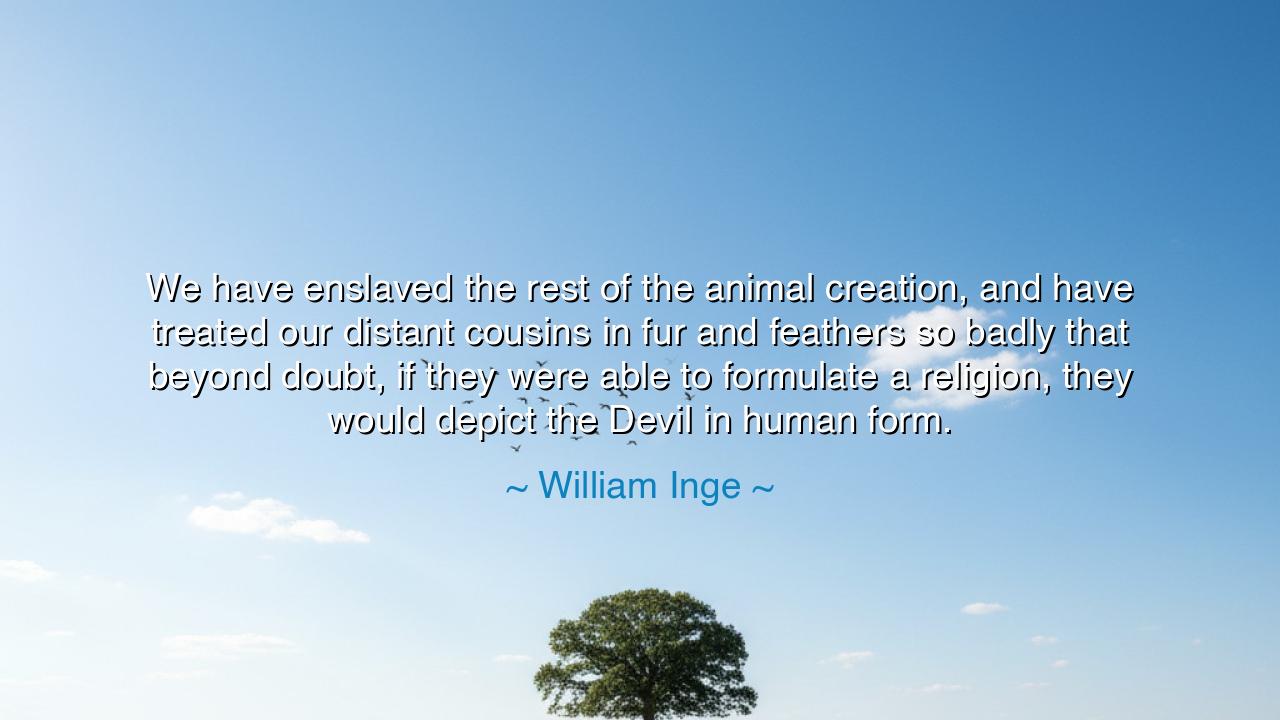
We have enslaved the rest of the animal creation, and have
We have enslaved the rest of the animal creation, and have treated our distant cousins in fur and feathers so badly that beyond doubt, if they were able to formulate a religion, they would depict the Devil in human form.






In the days when humankind first looked upon the beasts of the earth, there was a sense of kinship — for both were born beneath the same sun, breathed the same wind, and drank from the same rivers. Yet as ages passed, man, proud of his fire and his cunning, forgot the sacred bond that tied him to all living things. He raised his hand not in friendship but in dominion, and in doing so, broke a covenant older than written memory. William Inge, with his piercing insight, spoke the sorrowful truth when he said: “We have enslaved the rest of the animal creation, and have treated our distant cousins in fur and feathers so badly that beyond doubt, if they were able to formulate a religion, they would depict the Devil in human form.” In those words burns a mirror — not of flattery, but of reckoning — reflecting the cruelty we so easily justify in the name of progress and appetite.
Behold how man, master of reason, became the tyrant of all creatures. He who was meant to be the steward of the Earth turned conqueror, bending every living thing to his will. Forests have echoed with the cries of hunted beasts; the seas run dark with oil and blood. The cages of industry rattle with the despair of lives deemed lesser. And yet, in the eyes of those creatures, there is no malice — only the innocence of beings who seek merely to live. If they could pray, would they not ask deliverance from us? If they could dream, would not their nightmares bear our image?
In ancient times, sages taught that all life is bound by the Great Chain of Being, each link deserving of reverence. The wise among the Greeks saw the spark of divinity even in the humblest sparrow. The elders of the East spoke of ahimsa, the sacred duty of nonviolence toward every living soul. Yet in our modern haste, these voices fade like whispers in the wind. We have chosen dominion without mercy, power without purpose, and thus bear the burden of being the only species that kills not from hunger, but from vanity and sport.
Consider, then, the story of Anna Sewell, the author of Black Beauty. In the dark smoke of the Industrial Age, when horses were whipped to exhaustion on cobblestone streets, she gave voice to the voiceless. Through the eyes of a simple horse, she revealed the cruelty hidden behind the veneer of civilization. Her words stirred the hearts of thousands and changed the laws of her nation. It was one woman’s compassion that reminded humanity that beneath fur, feather, or hide, there beats a heart that feels pain and love as we do. Such is the power of empathy — the bridge between species, the key to redemption.
Let us not think Inge spoke only of beasts. His words are also a warning to the soul of man. For every act of cruelty toward creation wounds our own spirit. The hand that strikes an animal hardens itself against mercy; the heart that ignores suffering grows numb to justice. When humanity places itself as god but acts as devil, it loses the right to call itself wise. The measure of a civilization is not its monuments nor its machines, but the gentleness with which it treats the defenseless.
Therefore, my children of tomorrow, open your eyes to the silent suffering that surrounds you. When you see a caged bird, remember that freedom is its birthright as surely as yours. When you see a beast beaten or abandoned, know that it is not a creature apart from you — it is your distant cousin, born of the same breath. To walk gently upon the earth is not weakness but wisdom. To show kindness where none is expected is not sentiment but strength.
The lesson is clear and timeless: to reclaim our humanity, we must first restore our compassion. Feed the stray. Rescue the wounded. Speak against cruelty even when silence is easier. For in every act of mercy, we undo a small portion of the evil that history has written in our name. Let no man say that beasts alone cannot pray — for perhaps, through our deeds of kindness, we may yet become the answer to their unspoken prayers.
Thus, let Inge’s words echo as a sacred vow: to be the guardians, not the tormentors, of creation. For if we are to rise above the beasts, it will not be through power, but through love — the one divine gift that binds all life beneath the sun.






AAdministratorAdministrator
Welcome, honored guests. Please leave a comment, we will respond soon